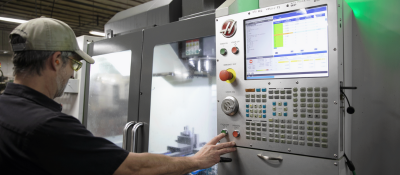Your Cart is Empty

Why Oil-Free Compressed Air?
Compressed air users are becoming increasingly intolerant of contamination in their systems, whether it's in a patient’s lungs, food and beverage products, pharmaceuticals, or semiconductors. Eliminating the risk of contaminated end product, saving money in energy use, and maintenance are only a few of the benefits.
There is an old adage which is also a law of physics; what goes in will eventually come out. This applies to compressor lubricant in oil-flooded rotary screw compressors. Compressed air users are becoming increasingly intolerant of contamination in their systems. Utilizing oil-free technology eliminates this risk.
Oil contamination is a factor of compressed that nearly every industry attempts to avoid. Whether it is in a patient’s lungs, food and beverage products, pharmaceuticals, semiconductors, many processes that require clean, dry air (CDA) lean toward oil-free systems.
CDA may mean different things in different industries in regards to dew point (how dry the air is), but all CDA systems have one thing in common: the air must be oil-free. This requires the use of oil-free air compressors. For industries that require compressed air to make their products, the higher the quality of the compressed air, the better the product and the lower the cost to produce it.
Most companies who have moved to oil-free air compressors started out using oil-lubricated air. System contamination was not detected and accumulated gradually. In some cases, this occurred within a year.
In some cases, the facility lasted almost five years until the inevitable occurred; contaminated products, production shut down, and the high cost to replace contaminated piping, filtration, dryers, receivers and compressors. In one case, the owner moved out of the facility entirely, installed oil-free compressors and lived with a six-month interruption in production: a tremendous price to pay.
Success Story: Fujimi
Fujimi products are used in a wide variety of applications, including semiconductor, LED, glass, plastics and other metals. In their Tualatin, Oregon location, Fujimi uses compressed air for pumping and creating vacuum, along with providing air for the operation of actuators within metrology and polishing equipment, and the operation of valving. Reliable, clean compressed air is critical to their process.
The Fujimi team was ready to consolidate their equipment and resources with the goal to reduce operating costs. On top of their goal to become more efficient, they had the requirement of using clean, dry air in their process. In the end, Fujimi chose a turnkey system that included two 50HP fixed speed and one 100HP variable speed KNW Series oil-free air compressors. This project resulted in an annual savings of over 500,000 kWHrs.
READ THE FULL STORY HERE

7 Ways Oil-Free Air Compressors Reduce Operating Costs:
- Eliminate the cost to collect and dispose of oil laden condensate.
- Avoid compressor oil separator element and downstream filter replacement cost.
- Avoid the extra energy cost to overcome the pressure drop in the compressor oil separator and downstream filtration (oil-free compressors use approximately 6% less energy because of lower discharge pressure).
- Eliminate contamination of desiccant in regenerative-type air dryers.
- Eliminate the cost of make-up oil that must be added to oil-flooded compressors.
- Reduce oil change intervals - oil free compressors require the oil to be changed annually. Oil-lubricated compressors generally require two more oil changes because ambient air is mixed with the oil, causing contamination and reduced oil life during high ambient conditions.
- Low unloaded horsepower - oil-free compressors unload within 2 seconds of command to unload and consume approximately 18% of full load horsepower when unloaded. This results in significant energy savings compared to oil-lubricated compressors.
The above costs associated with oil-lubricated compressors may not be apparent at the time of purchase but are contributors to the total cost of ownership. The best oil-free benefit of all is the elimination of risk of ruined end product, lost production and damaged reputation.
RELATED: 8 WAYS TO INCREASE THE ENERGY EFFICIENCY OF YOUR COMPRESSED AIR SYSTEM
The Best Industries for Oil-Free Air
While a wide variety of industries utilize oil-free compressed air, here are 3 industries that are best-suited:
Food & Beverage
The food and beverage industry is typically the first that comes to mind when considering oil-free air. Clean compressed air systems and vacuum systems are key to any food & beverage processing and packaging application.The risk of oil contamination is unacceptable, particularly where air comes in direct contact with product or packaging.
Oil free air prevents contamination of food & beverage products due to air compressor lubricant carryover. Additional filtration and drying systems can help ensure air is free from both moisture and particulate.

An oil-free KNW Series machine runs America's oldest distillery: Laird & Company
Medical & Pharmaceutical
In industries like pharmaceuticals, medical, dental, and laboratory, clean and reliable equipment can be essential to life. Whether dealing with laboratory compressed air systems or dental vacuum systems, any air contaminants can introduce unacceptable risk.
Systems like medical compressed air need be oil free to create a clean environment that protects processes and products from contamination. The compressed air must meet NFPA 99 requirements for use as medical air compressor and medical vacuum systems, including oil-less vacuum systems suitable for dedicated waste anesthesia systems.
High Tech
Fabrication of electronic devices requires controlled, oil-free compressed air for delicate processes like surface mounting technology, de-soldering, and test equipment. Printed circuit board (PCB) cleaning requires non-abrasive and low impact methods using compressed air to blow boards clean after production. Robotic pick and place equipment uses compressed air to place electronic components with speed and precision. In fact, in many high tech operations, compressed air is used to electronically convey equipment or operate sensitive valves.For sensitive equipment, oil contamination can mean an expensive maintenance project or a complete production shutdown. For highly sensitive electronics applications, systems that produce ISO 8573-1 class 0 oil-free air may be required.
Process vs. Plant Air
There’s one important factor many facilities pondering oil-free versus oil-lubricated compressed air need to know. What is the difference between process and plant air?
Process Air: Any compressed air that touches the final product or process. Systems like food packaging use process air to seal containers and bags. Respiratory air in hospitals, such as the air used in ventilators, also is considered process air. This type of air must meet stringent quality requirements.
Plant Air: Compressed air that does not come into contact with the final product. Air that is used to power pneumatic devices or conveying equipment is considered plant air. This air does not have the same stringent standards, as it is not coming into contact with the product itself, but rather being used to operate the equipment that does contact the product.
RELATED: HOW TO SELECT THE RIGHT AIR COMPRESSOR FOR A NEW PLANT

Oil-free air is increasing in popularity, as consumers tolerate less product contamination and facilities tighten their operations. Eliminating the risk of contaminated end product, saving money in energy use, and maintenance are only a few of the benefits.





